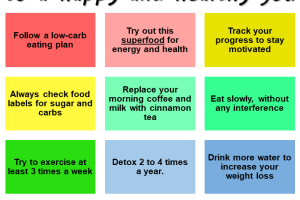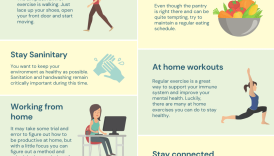Unlocking the Power of a Healthy Lifestyle: Tips and Tricks

Importance of a Healthy Lifestyle
Benefits of a Balanced Diet
A balanced diet is the cornerstone of a healthy lifestyle. It provides essential nutrients that the body needs to function optimally, ensuring that energy levels remain high and health risks are minimized. A well-rounded diet typically includes a variety of foods from all food groups: fruits, vegetables, whole grains, proteins, and healthy fats. Here are some key benefits of maintaining a balanced diet:
- Unlocking the Power of a Healthy Lifestyle: Tips and Tricks
- Importance of a Healthy Lifestyle
- Benefits of a Balanced Diet
- Impact of Regular Exercise
- Developing Healthy Habits
- Creating a Meal Plan
- Establishing a Workout Routine
- Importance of Mental Health
- Practicing Mindfulness
- Managing Stress Levels
- Importance of Proper Sleep
- Creating a Sleep Schedule
- Creating a Relaxing Bedtime Routine
- Importance of Hydration
- Benefits of Drinking Water
- Ways to Stay Hydrated Throughout the Day
- Improved Energy Levels: Foods rich in vitamins and minerals help in sustaining energy throughout the day. For example, a breakfast loaded with whole grains and fruits can kickstart your metabolic engine.
- Stronger Immunity: A diet rich in antioxidants, such as those found in fruits and vegetables, bolsters the immune system, making the body more resilient against infections.
- Weight Management: Eating a balanced diet helps regulate body weight. Nutrient-dense foods can help satisfy hunger more effectively than highly processed foods, reducing the likelihood of overeating.
For instance, consider Sarah, who switched from sugary snacks to whole fruits. She found herself feeling more energetic in the afternoons and less prone to cravings.
Impact of Regular Exercise
Alongside a balanced diet, regular exercise plays an equally pivotal role in shaping a healthy lifestyle. Engaging in physical activity doesn’t just improve cardiovascular health but also enhances mood and cognitive function. The benefits of exercise are profound and include:
- Increased Strength and Toned Muscles: Whether it’s lifting weights or doing yoga, regular workouts build muscle mass and strength, leading to increased endurance.
- Enhanced Mental Well-being: Physical activity releases endorphins, which are known as “feel-good” hormones. Many individuals find that after a workout, their mood improves significantly.
- Better Sleep Quality: Regular exercise can help regulate sleep patterns. For example, individuals who exercise regularly often find it easier to fall asleep and enjoy deeper sleep.
Overall, incorporating both a balanced diet and regular exercise is essential for a healthy lifestyle. They work in tandem to support physical health and psychological well-being, allowing individuals to feel their best both physically and mentally.
Developing Healthy Habits
Creating a Meal Plan
Having discussed the importance of a balanced diet and regular exercise, it’s time to dive into the practicalities of developing healthy habits. One of the most effective ways to maintain a balanced diet is by creating a meal plan. A well-structured meal plan not only saves time and reduces stress but also helps in making healthier choices. To get started, consider these steps:
- Assess Your Needs: Determine your dietary goals. Are you looking to lose weight, gain muscle, or maintain your current health?
- Incorporate Variety: Aim for a colorful plate. Include fruits, vegetables, lean proteins, whole grains, and healthy fats. A diverse meal plan keeps things interesting and ensures that you get a range of nutrients.
- Plan the Week Ahead: Dedicate some time each week to decide on meals for the upcoming days. For instance, you might plan grilled chicken with quinoa and steamed broccoli for Monday, then switch it up with salmon and sweet potatoes for Tuesday.
Here’s a simple weekly meal plan to illustrate:
| Day | Breakfast | Lunch | Dinner |
|---|---|---|---|
| Monday | Oatmeal with fruits | Chickpea salad | Grilled chicken with veggies |
| Tuesday | Smoothie bowl | Quinoa and black bean bowl | Salmon with sweet potatoes |
| Wednesday | Greek yogurt and honey | Turkey wraps | Stir-fried tofu and rice |
This approach can help make grocery shopping much easier, ensuring you buy only what you need.
Establishing a Workout Routine
Just as crucial as meal planning is establishing a workout routine that fits your life. Consistency is key when it comes to reaping the benefits of exercise. To create an effective workout plan:
- Set Realistic Goals: Whether it’s aiming for 30 minutes of exercise three times a week or training for a marathon, having clear objectives can help you stay motivated.
- Choose Activities You Enjoy: Exercise shouldn’t feel like a chore. If you love dancing, consider Zumba classes; if you prefer solitude, perhaps running or cycling is your thing.
- Schedule Your Workouts: Treat your workouts like important appointments. Block time on your calendar and stick to it. For example, a morning jog before work can set a positive tone for your day.
- Track Progress: Maintaining a journal or using apps can help track your workouts. Celebrate small achievements, such as running an extra mile or lifting heavier weights.
For example, Jake started incorporating a mix of strength training and cardio into his week. By documenting his workouts, he noticed greater improvement within just a month, keeping him motivated to continue. Developing these healthy habits through meal planning and establishing a workout routine sets the foundation for long-term wellness, elevating both physical and mental health.
Importance of Mental Health
Mental health is an integral part of overall well-being, yet it is often overlooked. Just as we prioritize physical health through exercise and balanced nutrition, nurturing mental health is equally essential. In this section, we’ll explore the benefits of practicing mindfulness and effective strategies for managing stress levels.
Practicing Mindfulness
Mindfulness involves being fully present in the moment, which can lead to a profound sense of peace and clarity. Incorporating mindfulness practices into daily life can help improve focus, reduce anxiety, and promote emotional well-being. Here are a few simple ways to practice mindfulness:
- Meditation: Even a few minutes a day can have a significant impact. For instance, Emily began meditating for just 5 minutes each morning and noticed that her thoughts were clearer and her stress levels decreased.
- Deep Breathing: Take a moment to pause and focus on your breath. Inhale deeply for a count of 4, hold for 4, and exhale for 4. This technique can be particularly effective during stressful moments.
- Mindful Eating: Rather than rushing through meals, take time to savor each bite. Not only does this enhance enjoyment, but it also promotes better digestion and appreciation for food.
Managing Stress Levels
Stress is a common aspect of modern life, but how we manage it can vastly affect our mental health. Identifying stress triggers and employing coping strategies is essential for maintaining a balanced mindset. Here are some effective strategies for managing stress:
- Physical Activity: Engaging in exercise releases endorphins, which are natural stress busters. Whether it’s a brisk walk or an intense workout, just moving your body can lighten your mood.
- Time Management: Organizing tasks can prevent last-minute rushes that lead to stress. Consider using tools like planners or digital calendars to allocate time effectively, allowing for breaks and self-care.
- Social Connections: Talking to friends or family about what’s troubling you can provide support and perspective. For example, Mark found that spending time with friends on weekends helped him unwind from a hectic workweek.
- Creative Outlets: Engage in hobbies or activities that bring joy, whether it’s painting, gardening, or playing an instrument. These activities not only provide a distraction from stress but also stimulate positive emotions.
By prioritizing mental health through mindfulness practices and effective stress management techniques, individuals can create a healthier, more balanced lifestyle. Ultimately, a positive mental state enhances resilience and contributes to overall well-being, allowing for a better quality of life.
Importance of Proper Sleep
Having covered mental health, we now turn our attention to an often underestimated pillar of well-being: proper sleep. Quality sleep is crucial for physical health, mental clarity, and emotional regulation. A well-rested individual is generally more productive, creative, and resilient to stress. To enhance sleep quality, it’s essential to establish a consistent sleep schedule and create a relaxing bedtime routine.
Creating a Sleep Schedule
One of the simplest yet most effective ways to improve sleep quality is to create a regular sleep schedule. This process involves going to bed and waking up at the same time every day, even on weekends. Here’s how to get started:
- Set Target Sleep and Wake Times: Identify how many hours of sleep you need—most adults require about 7–9 hours. If you need to wake up at 6 a.m., plan to go to bed between 9 p.m. and 11 p.m.
- Gradually Adjust Your Schedule: If you’re used to going to bed late, gradually shift your bedtime earlier by 15-30 minutes each night until you reach your goal.
- Prioritize Consistency: Sticking to your sleep schedule, even on days off, helps train your body’s internal clock, making it easier to fall asleep and wake up at the desired times.
For instance, Jess noticed a significant improvement in her energy levels after committing to a sleep schedule. The simple act of waking up and sleeping at the same time made her feel more alert during the day.
Creating a Relaxing Bedtime Routine
Beyond establishing a sleep schedule, a calming bedtime routine can significantly enhance the quality of sleep. Preparing the body and mind for rest signals that it’s time to wind down. Here are some steps to implement:
- Dim the Lights: Lowering the lighting around your home in the hour leading up to bedtime can help promote melatonin production, the hormone responsible for sleep.
- Limit Screen Time: Aim to avoid screens—phones, computers, and televisions—at least 30 minutes before bed. The blue light emitted can interfere with melatonin release.
- Engage in Relaxing Activities: Find calming practices that work for you, such as reading, listening to soothing music, or practicing gentle stretches. For example, Chris often winds down his day with a cup of herbal tea and a few pages of a good book.
- Create a Comfortable Sleep Environment: Ensure your bedroom is conducive to sleep. This can include a comfortable mattress, cool room temperature, and minimizing noise and distractions.
By making an effort to create a consistent sleep schedule and an inviting bedtime routine, individuals can experience the profound benefits of proper sleep. This, in turn, not only rejuvenates the body but also enhances cognitive function and emotional well-being, contributing to an overall healthy lifestyle.
Importance of Hydration
Having explored the significance of proper sleep, it’s essential to highlight another fundamental aspect of health: hydration. Often overlooked, staying properly hydrated is vital for overall well-being. Our bodies rely heavily on water for a multitude of functions, including temperature regulation, nutrient transportation, and maintaining energy levels.
Benefits of Drinking Water
Drinking adequate amounts of water comes with a plethora of benefits that can significantly impact daily performance and health. Here are some key advantages of staying hydrated:
- Enhances Physical Performance: Even mild dehydration can impair physical performance. Athletes, for example, often find that drinking enough water can prevent fatigue and improve endurance during workouts.
- Boosts Cognitive Function: Proper hydration is closely linked to brain function. Studies show that dehydration can affect concentration, alertness, and short-term memory. For instance, after Sarah started carrying a water bottle to the office, she noticed her focus improved and her afternoon slumps became less frequent.
- Supports Digestive Health: Drinking enough water aids digestion by helping to break down food and prevent constipation.
- Promotes Healthy Skin: Keeping skin adequately hydrated can enhance its elasticity and appearance, leading to a more radiant complexion.
Ways to Stay Hydrated Throughout the Day
Now that we’ve established the importance of water, how can one ensure they stay hydrated during the day? Here are some effective strategies:
- Carry a Reusable Water Bottle: Keeping a water bottle within arm’s reach serves as a constant reminder to drink. Setting specific drinking goals, like finishing a bottle by noon, can be motivating.
- Set Reminders: Use smartphone alarms or apps designed to remind you to drink water. A simple nudge can make a significant difference.
- Infuse Your Water: If plain water doesn’t excite you, jazz it up with natural flavors. Adding slices of lemon, cucumber, or mint can make hydration enjoyable.
- Eat Water-Rich Foods: Incorporating fruits and vegetables high in water content into your diet is a delicious way to boost hydration. Foods like watermelon, cucumbers, and oranges can play a significant role in your daily water intake.
- Pair Water with Meals: Make it a habit to drink a glass of water before each meal. This not only keeps you hydrated but can also aid in digestion and help control portion sizes.
By recognizing the importance of hydration and actively finding ways to incorporate more water into daily routines, individuals can experience enhanced energy levels, improved focus, and overall better health. Staying hydrated is a simple yet powerful step toward achieving optimal wellness and enhancing quality of life.





